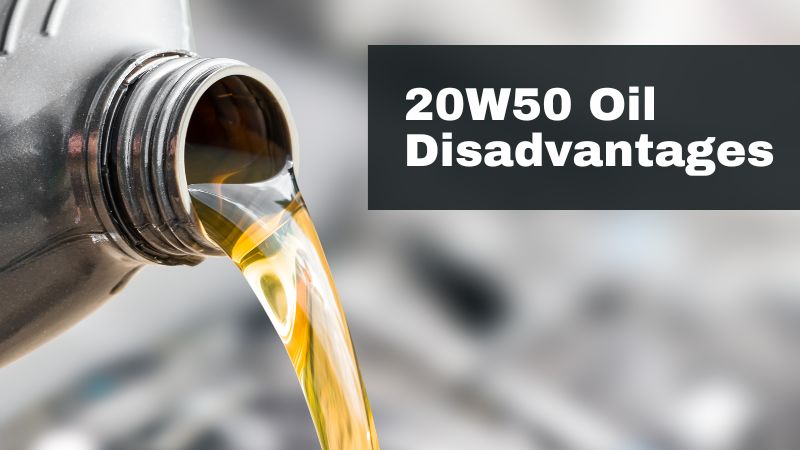Imagine pouring thick molasses into your car’s engine instead of oil.
Sounds absurd, right?
Yet, that’s essentially what you’re doing when you use 20W50 oil in modern engines. This viscous oil, once a staple for older vehicles, can wreak havoc on today’s sophisticated engines. If you’ve ever been tempted to use it, thinking it might offer better protection, prepare for a revelation.
We’ll talk about:
- The disadvantages of 20W50 oil
- If it’s bad for your car?
- And what to do if you used 20w50 in your car
Don’t miss out below!
Is 20W50 Oil Bad For My Car?
20w50 engine oil is not a widely used engine oil as it is a very viscous oil and does worse than good for regular car engines, especially for modern car engines which have a lot of new and complicated technology in them, such as Variable Valve timing mechanisms.
Not only that, power in Engines using this oil will be facing a severe reduction in power alongside poor fuel economy and worsened emissions.
Thicker oils like 20W50 can potentially impact the efficiency of Variable Valve Timing (VVT) systems in modern engines. While these oils may not necessarily throw the timing system “out of sync”, they could lead to suboptimal performance and increased wear over time, especially if the engine is designed for a lower-viscosity oil.
This happens due to the fact that most modern Variable Valve Timing systems such as VANOS from BMW, VTEC from Honda, or VVTI from Toyota, all rely on the engine oil pressure, and when oil with higher viscosity is utilized, the engine oil pressure increases, causing damage to the lifters, cam bearings, and piston rings.
Symptoms of these will be lifter tick, cam noise and blue smoke from the exhaust due to the engine oil being burned as the piston rings wear out prematurely.
Oil pumps will wear out prematurely due to the increased thickness, which the pump was not designed for, therefore wearing out the pump earlier, cars with turbocharged engines will fail earlier as the turbo bearings which receive the oil, will fail due to the thickness which it can not handle.
Gas mileage will be severely impacted, but that will be the least of your problems. Sludge will build up within the crankshaft/camshaft and then cause the bearings to fail along with the cams, which will result in the catastrophic failure of your engine or seize together.
20w50 oils were never intended to be used in newer vehicles, it was used in engines up until the early 80s in older cars, and it was one of the reasons why some older cars had engines that only lasted up until 100,000 miles before failing and requiring a complete rebuild alongside new parts.
20w50 has a better chance of working in hotter climates, but it is still too thick for any modern car engine. Often, shady sellers or dealers fill up car engines with 20w50 oil to hide lifter tick and bearing noise temporarily, which it does a good job at when the car is not up to temperature yet, which is enough to reassure the unsuspecting buyer.
What to Do if You Used 20w50 in Your Car
You can avoid this by inspecting the car yourself or having the car inspected by a professional mechanic you can trust. It can be very easy to mess up and put the wrong oil into your car, especially if you do not have the technical knowledge, if you run 20w50 oil, your engine will not grenade itself immediately, but will slowly but surely wear out earlier than usual, newer cars will put the engine into limp mode due to the increased oil pressure, which can help you realize your mistake earlier on and prevent it.
If you’ve noticed that you put in the wrong grade of oil, you can always have an expert assess your vehicle for any damage and then top it off with the right oil meant for the car, always look for the sticker label on the bottle that would indicate the type of oil your car recommends, the information is found in the owner’s manual of your car and also, in some cars, underneath the hood or bonnet. So, in the end, 20w50 does nothing but harm the car, and cause catastrophic failure if continuously used in a modern engine.

Robert Anderson is a world class motorhead who rebuilt his first carb at age 10, his first engine at age 15, and completed his first full hotrod build when he was just 18! Previously, he has ran a part warehouse, delivered pizzas, and managed the service department for a $20 million/year revenue dealership. Robert knows cars like few others and he is passionate about sharing his knowledge.

